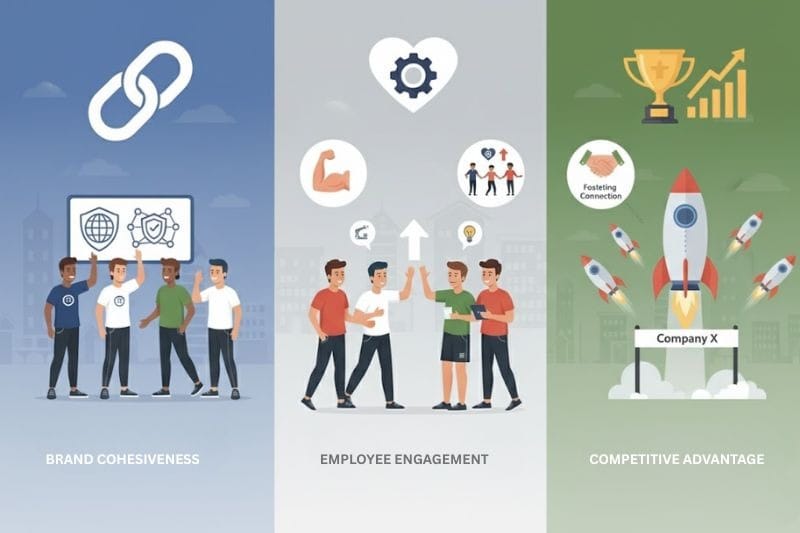Defining company core values: A complete guide with examples
Define and live your company's core values with purpose. Discover how strong values shape culture, empower teams, and build lasting success with BuddiesHR insights.

If you want to see the faces of your People Ops team light up, just mention: ‘Company values’. It’s like you’ve just said the magic phrase that leads to Narnia (i.e. a perfect world). That’s great, but how do the rest of your employees respond to discussions about company culture?
For many companies, defining company core values can be a challenge. Communicating them is an exercise in broken telephone, and leaving them some vague realisation of a vision that doesn’t hit home.
But all that’s about to change - because defining an organisation’s core values and living them is indeed the path to building a successful business, defined by cohesion, responsiveness, and a pursuit of excellence.

Quick Overview
Company core values are the guiding principles that shape how your employees behave, make decisions, treat each other, and deal with customers. They go beyond vague slogans and get to the heart of how your company delivers value to the market. Defining core values helps you to bring them to life in hiring, recognition, and performance management.
Table of Contents
- What are the core values of a company?
- Why is defining strong company values important?
- Bringing your core values to life (because they’re not just words)
- Conclusion
- FAQs: Company core values
What are the core values of a company?

The simplest way to think of core company values is as guidelines for how people should behave in the workplace. Don’t get us wrong, it’s much more than a list of dos and don’ts. But it does provide the spoken guidebook for how things are done. Values encourage employees to communicate the message the company wants to convey to the marketplace.
From the outset, we need to clarify terms that are sometimes used interchangeably but have different meanings. These are values, mission, and vision.
- Mission: What you do, and why you do it.
- Vision: Where you want to go (future aspirations).
- Values: How you do things while you work towards future aspirations.
To clarify these terms even further, let’s take a look at examples of three well-known global companies.

*defined as anyone with a body
These core value examples show the diversity of purpose held by these companies, and yet they all drive towards one thing: results! Shaping the workplace culture is therefore a way to communicate fundamental beliefs and business strategy.
Sometimes vision, brand, values, and your team slip out of alignment…things get blurry. That’s when you need to challenge the status quo and reenergize strong core values.
Apps like BuddiesHR help you share your values with your employees again and keep them there. With simple Slack integration, you can:
- Send a pulse survey to check how your employees understand your existing values.
- Communicate your company's core values with fun daily messages on Slack.
- Give kudos to company employees who actively practice your core values.
- Encourage employees to share how their own values and the company values line up. This helps to keep things fresh and relevant.
Why is defining strong company values so important?

Drawing from the examples we provided from Nike, Tesla, and Starbucks, we can break down what it takes to form a strong company culture. Across the globe, these companies have strong brand recognition and cohesiveness. In other words, wherever you are in the world, you’ll get the same product, same experience, and same inspiring core values being displayed.
Take a look at their career pages online, and you’re going to see their core mission, vision, and values put forward as a way to attract a certain kind of employee - one whose personal values align with the corporate values. Why? Because you want to attract people who already want to display the values you cherish. This increases not only employee engagement but also employee satisfaction.
Engaged employees
When Forbes Business Council looked into the correlation between personal values in the workplace, they found the following benefits:
- Enhanced job satisfaction.
- Improved mental and emotional well-being.
- Increased motivation and productivity.
- Stronger organisational commitment and loyalty.
- Increased personal and professional growth.
Competitive advantage
The success and visibility of our three featured companies speak volumes to the drive and passion they hold for communicating their company values. They have the competitive advantage precisely because their values are lived out loud. They show up in every pitch, product launch, and customer interaction.
When the people who make up your organisation know what you stand for and how to put that into practice (values), they don’t wait for instructions. Daily operations become a way to express corporate culture and drive customer satisfaction. This is why some brands just feel consistent. Walk into a Starbucks in Cape Town, or Chicago - you’ll feel the same energy and intention - to make you a great cup of coffee while you feel right at home.
🤐 HR tells their secrets: Tools like BuddiesHR make it easier to bake your company’s core values into hiring, performance reviews, and recognition programs — helping your team live the values daily, not just talk about them.
Bringing your core values to life (because they’re not just words)

You don’t want your company values to become relics in a company document or value statements used only by the marketing department. You need to embed them in the daily rhythm of your workplace for them to affect the company’s success.
When you’ve defined your core values, they need to start showing up in communication, business practices, decision-making, and even environmental initiatives. They should become the heartbeat of your organisation.
Here are three highly impactful ways to do this:
- Teaching the executive team and leadership team to embody the company values.
- Structure employee recognition programs around company culture. When behaviour is generously rewarded, it is more likely to drill down to every level of worker in the company.
- Reference core values in performance reviews. This helps them evolve from abstract ideas to actionable steps, encouraging team member growth and continuous learning.
Insider Insight: Need help defining your core values? Check out our detailed guide with 80 examples of company core values and how to create your own - it’s packed with practical templates and inspiration from 300 successful businesses.
Conclusion
Defining your company's core values is all about far more than crafting clever-sounding statements. It’s about defining who you are and how you do things - even when no one is watching.
When your values are part of everyday interactions and kept alive by your employees, they become the heartbeat of your organisation, breathing new life into it year after year. The best companies don’t just make a show of defining values; they activate them through leadership and recognition.
Do you dream about your business, brand, and products getting global recognition? Then set strong values, and live them with passion.
With BuddiesHR, you can bring your company’s core values to life — from daily recognition to performance reviews — so your culture isn’t just defined; it’s lived. 👉 Get started right now.

FAQs: Company core values
1. What are the five main core values for companies?
While there is no universal list of core values for companies, many define integrity, teamwork, innovation, results orientation, and customer focus as the five top core values. What makes these core values important is that they reflect how most companies realise their vision.
2. What seven values are more important to a business?
Respect, transparency, collaboration (teamwork), adaptability, excellence, trust, and innovation often rank highly on lists of company values. This is especially true for organizations that value growth and ethical business practices. Where a company’s dedication is directed towards people empowerment, you can expect to see trust, accountability, transparency, continuous learning, inclusion, and purpose as values.
3. Can company values change over time?
Absolutely. Company values can change as your company grows and becomes more sure of what it wants to offer the market. The core values of strong brands tend to stand the test of time because they’re firmly entrenched in brand building. For smaller companies, a core values evolution is more likely and perfectly acceptable.
4. What makes company values more authentic?
The key to authenticity is to understand that values are rooted in observable behaviour, not just talk or wishful thinking. Then they are an important part of the culture, they are easy to recognize, and difficult to fake. When your employees can identify real examples of your values in action, you’ve nailed authenticity.
5. Why do some company values fail?
Values fail when people are not committed to them. They don’t hit home, aren’t supported by leadership, and don’t stick because they’re disconnected from the realities of reaching objectives. Other reasons for failure are that values are not accurately modeled, and reward systems are not connected to core values.
References:
1. https://www.nike.com/help/a/nikeinc-mission
2. https://www.tesla.com/about
3. https://archive.starbucks.com/record/our-mission
5. https://careers.starbucks.com/culture/mission-and-values/




